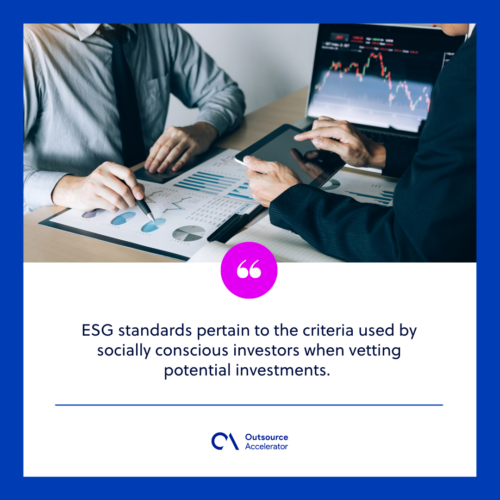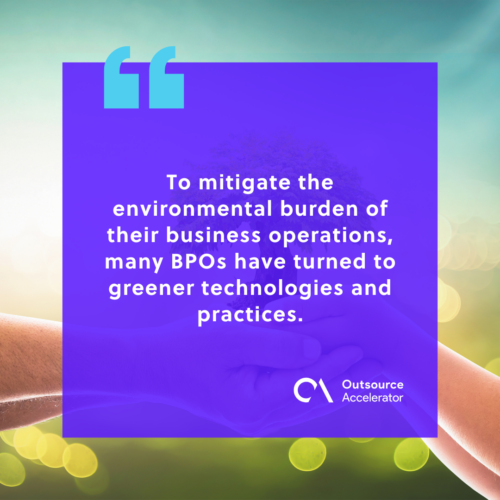Derek Gallimore is a contributor to Forbes.com and a member of the Forbes Business Council. This article was first published on Forbes.
Sustainability and sustainable development are familiar concepts in the corporate world. Sustainable development involves creating goals relating to humanity’s environmental, social and economic challenges. These challenges range from global warming and regional conflicts to poverty and gender discrimination.
While it’s a noble goal, achieving sustainability and compliance with global environmental, social and governance (ESG) standards hasn’t been the easiest of undertakings. Factors affecting ESG in business management are complex and multifaceted, which explains why businesses may have a difficult time complying with global standards.
Even so, ESG remains an important aspect that’s as much a part of any business as returns on investment (ROI).
Understanding ESG
ESG standards pertain to the criteria used by socially conscious investors when vetting potential investments. These three pillars—environmental, social and governance—are used to measure a company’s commitment to sustainable development.
While not an entirely novel concept, ESG compliance has again caught mainstream corporate consciousness’ attention. This renewed attention is due in no small part to the climate crisis and sociopolitical unrest in many parts of the world. These existential threats have far-reaching implications that affect even the corporate world.

Below are more detailed discussions of each pillar of sustainability in the context of businesses:
Environmental
The environmental aspect of ESG refers to a business’s actions (or lack thereof) toward protecting the environment. It considers how a company uses natural resources and how its operations impact the environment.
Corporate environmental responsibilities include policies on responsible waste management, carbon footprint reduction and natural resources and energy conservation. Companies that fail to uphold environmental considerations risk financial repercussions, whether through government sanctions, prosecution or reputational damages.
Social
ESG’s social aspect pertains to a company’s relationship with stakeholders—both internal and external. Charity drives and donations often exemplify a company’s commitment to social responsibility.
Working conditions also reflect a company’s compliance with the “S” in ESG. Businesses can also show corporate social sustainability through efforts to improve the quality of life of their employees, customers and the community. These efforts often include equal employment opportunities, safe working environments, workplace diversity and community drives.
Governance
The final pillar of ESG—(corporate) governance—refers to the factors affecting decision-making. These include companies’ policies and guidelines that affect every stakeholder—from shareholders and managers to customers.
While often overlooked in favor of the environmental and social pillars, sustainable corporate governance is nonetheless essential for business growth. Poor governance has led to some of the biggest corporate scandals. Needless to say, these blunders can do a number on the shares of the companies involved.
How BPOs help the push for sustainability
The globalization of businesses has led to the rise of one of today’s mammoth industries—the business process outsourcing (BPO) industry. The sector has transformed from a niche business strategy to a staple in many businesses and has grown into the over $92.5 billion industry it is today.
Outsourcing has done much in the name of social responsibility, including giving citizens from developing countries employment opportunities that are otherwise unavailable to them, paving the way for better infrastructure in these countries and improving the standard of living for many people.
BPO firms are also invested in the fight against the climate crisis. Many of these firms have operations in countries like the Philippines, India and Cambodia, which can be vulnerable to extreme weather effects. To mitigate the environmental burden of their business operations, many BPOs have turned to greener technologies and practices.
Some examples of the green movement within the BPO industry include the sector’s biggest players. For example, Teleperformance has consistently ensured eco-friendly operations through its Citizen of the Planet initiative, launched in 2008. The company is staunch in following through on its commitment to reduce its carbon emissions by a significant amount (49% for GHG scopes 1 and 2, 38% for scope 3) by 2026.
Accenture is another industry leader in recognizing the importance of ESG metrics to businesses. The firm has been taking steps to achieve its goal of reaching 100% e-waste recycling by 2025. Like Teleperformance, Accenture is also beholden to reducing its Greenhouse Gases Scopes 1, 2 and 3 emissions.

Addressing the challenges
Fully committing to a sustainable growth plan is no easy feat, even for the larger players in the BPO sector. In trying to appear sustainable to social investors, many companies miss the forest for the trees.
For instance, companies trying to embrace women’s empowerment may put women in leadership positions without first trying to understand the underlying conditions that necessitated the movement in the first place (i.e., better results do not come from having women in leadership positions, but from not having any one role dominated by one gender).
Another example is companies jumping on the green movement “bandwagon.” Businesses that join the growing number of businesses turning to green technology and practices with the sole intention of attracting eco-investors are missing the point.
Noble intentions notwithstanding, trying to work around problems without addressing their root cause can result in Band-Aid solutions that prolong these situations.
What BPO companies—or any company, for that matter—need first is to understand the underlying issues that precipitated the need for sustainable growth among businesses.
Only when leaders understand these issues—what is at stake, how ESG-related issues will affect them and how they, directly and indirectly, contribute to these problems—will companies be able to take genuine actions toward sustainability.
Even seemingly small actions, when consistently carried out across many companies, can have a significant impact on the corporate path toward sustainability. For instance, company shuttles that carpool employees to and from work reduce the number of vehicles going out on any given day. In turn, this reduces carbon emissions and vehicular traffic in their localities. It could also improve employee engagement, making it a win-win solution.
Partnering with sustainable vendors for supplies is another way BPO companies can champion ESG ideals. It sends a message to B2B companies that BPO companies are more likely to invest in ESG-compliant vendors.
While the effects may seem negligible when done by just one company, they become more impactful and noticeable when many companies participate.

 Independent
Independent





















